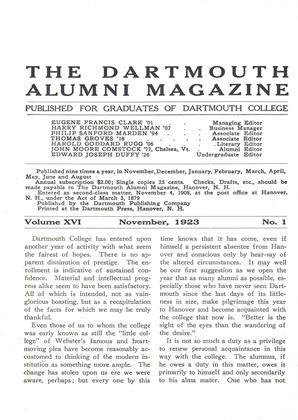In a radical departure from the accustomed policy of Palaeopitus, the 1924 senior governing body has drawn up and published what it pleases to call a "declaration of policy" by which its actions will be determined this year. Among the unusual features of this platform are plans whereby the group hopes to wipe out the much-talked-of "liquor problem" on the campus and in places where the name of Dartmouth is concerned, to bring about a restoration of a spring Prom or house parties and to clear up certain phases of the complex fraternity situation.
The statement follows:
"That there may be an intelligent understanding among the undergraduate body of the purposes of Palaeopitus and, furthermore, that Palaeopitus may more effectively 'bring into close touch and working harmony the various branches of college activities, preserve the customs and traditions of Dartmouth, promote her welfare, and protect her good name' — as required in the society s constitution — the 1924 Palaeopitus of Dartmouth College submits to the College the following declaration of policy:
1. Since it is apparent to the entire College that the drinking of intoxicating liquors cannot help but sully the good name of the College, Palaeopitus sets itself down as vigorously opposed to such drinking in Hanover and wherever the name of Dartmouth is concerned. This does not mean that Palaeopitus shall constitute itself a police force to parade Hanover streets in search of violators. It does mean, however, that any persistent violation on the part of any individual or fraternity will bring immediate measures to protect the reputation of the College.
"2. Palaeopitus, believing that the sentiment of the College favors some sort of spring house party, week-end or week-ends, requests the Administration to reconsider the wisdom of re-establishing Junior Prom or of agreeing to spring house parties. Palaeopitus, in turn, agrees to take upon itself the responsibility of assuring the Administration that such parties shall be conducted properly and to the Administration's complete satisfaction.
"3. Palaeopitus, in the light of the recent discussion of violations of fraternity rules, offers its services to the Interfraternity Council to act as a judicial committee to adjudge all Cases of violations of the rules. Palaeopitus feels that any healthy fraternity life presupposes strict adherence to the rules of the Council; and with the Council's consent it will be glad to assume the responsibility of seeing that the rules are honored in every detail.
"4. That the fraternity situation may further approach desired perfection, Palaeopitus would also suggest to the Interfraternity Council that a No-Deal Agreement be unanimously agreed upon by the fraternities so that any election deals may find community disapproval. In this connection also, Palaeopitus offers its services as a judicial committee.
"5 Upon the basis of Palaeopitus' recent amendment to its constitution providing that no member of the organization may hold two positions of Palaeopitus standing (for example, a major managership and the presidency of the Christian Association or of the Outing Club) Palaeopitus would suggest to undergraduates with extra-curricular ambitions that they confine their efforts to one field of activity. Palaeopitus feels that more men should be permitted to achieve success in activities, and this is not possible when one man holds several campus positions. Moreover, Palaeopitus suggests, since effective work can be done in only one field', that fraternities restrain their members from seeking leadership in more than one field of activity. Previous Palaeopitus groups have discussed point systems, but the 1924 Palaeopitus feels that more effective than legislation would be a public sentiment wisely directing individual initiative.
"6. Palaeopitus, in conclusion, would have the College know that its meetings are open to any one who may care to present business for its consideration; and in this connection it publishes Article 3 of its By-Laws:
" 'This society shall always be open to the suggestion and appeals of undergraduates, or others connected with the College, and such persons may appear before the society upon signifying their intention in advance to the secretary. Meetings are held every Monday evening at 8.45 in 19 Robinson Hall.'
(Signed), "C. G. Aschenbach J. S. Austin W. H. Cowley J. A. Fleming O. C. Grauer K. A. Harvey E. H. Learnard R. M. Morgan D. A. Perry F. E. Sheehy A. N. Thurston."
 View Full Issue
View Full Issue
More From This Issue
-
 Article
ArticleTHE GOAL OF EDUCATION
November 1923 By ERNEST MARTIN HOPKINS -
 Article
ArticleDartmouth College has entered upon
November 1923 -
 Article
ArticleAFTER TEN YEARS
November 1923 By FRANK LATIMER JANEWAY -
 Class Notes
Class NotesCLASS OF 1910
November 1923 By Whitney H. Eastman -
 Class Notes
Class NotesCLASS OF 1903
November 1923 By Perley E. Whelden -
 Class Notes
Class NotesCLASS OF 1917
November 1923 By Ralph Sanborn
Article
-
 Article
ArticleCALEB MILLS, EDUCATOR
May 1916 -
 Article
ArticleF. A. HOWLAND '87 NOMINATED FOR TRUSTEESHIP
June, 1922 -
 Article
ArticleBlind, Wins Math Prize
July 1949 -
 Article
Article2000
MAY | JUNE 2016 By —Kelly Heaps -
 Article
ArticleThe Undergraduate Chair
November 1955 By RICHARD L. GORDON '56 -
 Article
ArticleMEMORIAL FIELD AND ITS DEDICATION
December, 1923 By WILLIAM SEW ALL '17


